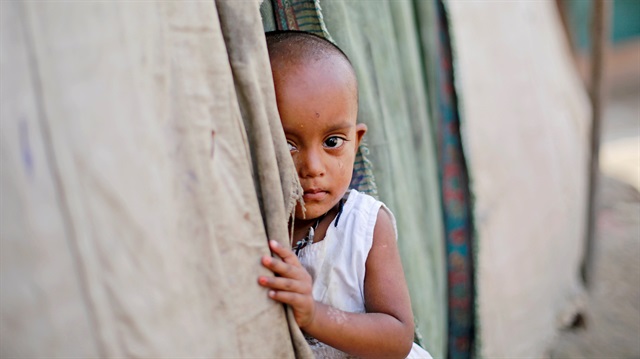

A girl from the Rohingya community stands outside her family's shack
UNHCR spokesman says agency expects explanation from India on deportation of 7 refugees to Myanmar
The United Nations refugee agency on Friday said it is "deeply concerned" over the forced deportation of the seven Rohingya refugees by the Indian government.
In a news conference, Andrej Mahecic, a UNHCR spokesman, said the organization is expecting an explanation from the Indian authorities on the deportation of seven refugees to Myanmar.
Mahecic said around 18,000 Rohingya Muslims -- who were registered to UNHCR -- are living as a refugee in India's several regions. The agency had issued IDs for the refugees to prevent their deportation or arrest.
"The context, as I said, of this return is worrying given what has been happening and the scope of the refugee crisis that we have seen unfolding in Myanmar, especially with more than 720,000 people fleeing toward Bangladesh and other countries in the area," he said.
On Thursday, India deported seven Rohingya Muslims to Myanmar, hours after the country’s top court refused to stop the government from deporting them.
The immigrants were detained in 2012 and since then they were kept at the Silchar central prison in Cachar district of Assam, the northeastern state of India.
- Rohingya Persecution
Since Aug. 25, 2017, nearly 24,000 Rohingya Muslims have been killed by Myanmar’s state forces, according to a report by the Ontario International Development Agency (OIDA).
More than 34,000 Rohingya were also thrown into fires, while over 114,000 others were beaten, said the OIDA report, entitled "Forced Migration of Rohingya: The Untold Experience".
Some 18,000 Rohingya women and girls were raped by Myanmar’s army and police, and over 115,000 Rohingya houses were burned down and 113,000 others vandalized, it added.
According to Amnesty International, more than 750,000 Rohingya refugees, mostly children and women, fled Myanmar and crossed into Bangladesh after Myanmar forces launched a crackdown on the minority Muslim community in August 2017.
The Rohingya, described by the UN as the world's most persecuted people, have faced heightened fears of attack since dozens were killed in communal violence in 2012.
The UN has documented mass gang rapes, killings -- including of infants and young children -- brutal beatings, and disappearances committed by Myanmar state forces. In a report, UN investigators said such violations may have constituted crimes against humanity.
#Andrej Mahecic
#India
#Myanmar
#Rohingya
#UNHCR

